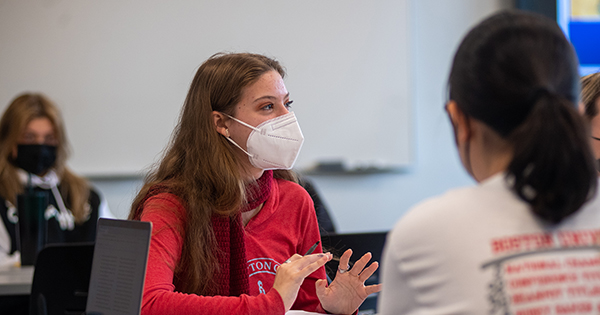Infection
COVID Is on the Rise Again—What You Need to Know
Feeling sick? Test. Tested positive? Isolate for five days
As much as we might wish it so, it is not so. COVID-19 is still here, a new variant has emerged, and with it a late-summer spike in coronavirus infections. The two-week period ending August 12 saw hospitalizations across the country rise by 24 percent, according to the Centers for Disease Control and Prevention, led by outbreaks at summer camps and preschools and even in some office buildings (maybe starting with parents of those kids who brought it home to them).
So as Boston University prepares for the start of a new school year, Student Health Services has some important points to share about COVID and campus life:
What should you do if you have COVID-19 symptoms?
Get tested! It’s easy. You can find self-tests in local pharmacies all around the city.
OK, you’ve tested and it’s positive. What should you do if you have COVID-19?
Isolate—for at least five days—and wear a mask around others for 10 days. If you have ongoing concerns, get in touch with Student Health Services or your primary care doctor. While the specific duration of an individual’s contagiousness can differ, the majority of people will not be contagious after five days of symptoms if their symptoms are improving and they are fever-free.
Should you be worried about the new variant causing a different reaction than earlier ones? Will the boosters work against them?
Viruses undergo mutations and the most recent SARS-CoV-2 variant of interest is called BA.2.86, or “Pirola,” by variant trackers. Researchers are closely observing it because of the number of mutations and the potential for increased resistance against antibody responses. But so far, the new variant has not been elevated to a level of concern and has not been associated with increased disease severity.
Although scientists believe the new variant has an increased probability of evading the immune response, it is probable that the vaccines available, including boosters, still retain effectiveness in limiting the severity of disease, and death. The initial vaccines, even though they were designed for a specific virus version, have continued to help prevent severe complications in variants. The greater potential for breakthrough infections, or infections among those who are vaccinated, may lead to increased cases in the fall.
One private college in Atlanta recently announced it would require mandatory wearing of face masks. Should more of us be wearing them again? What about testing?
COVID-19 has unfortunately become an enduring aspect of our lives and is not showing signs of going away any time soon. However, we have a number of strategies to prevent transmission and reduce severity. We advise individuals who are immunocompromised or who have risk factors for severe illness to wear well-fitted masks in crowded settings during times of heightened transmission. It’s also recommended that everyone stay up to date with COVID-19 vaccines and that those who are experiencing COVID-19–like symptoms be tested through at-home antigen tests or through PCR testing.
It’s important to remember that taking care of yourself physically and mentally, including engaging in physical activity, getting enough sleep, and eating a variety of nutritious foods, can help reduce the risk of severe disease or complications. Student Wellbeing has an easy-to-use list of campus resources that support all the dimensions of your wellbeing.
How worried should we be about long COVID?
We are continuing to learn about long COVID. However, we do know that those with risk factors for severe disease are more likely to experience long COVID. Utilizing the tools and strategies mentioned earlier can help to reduce the likelihood of long COVID.
What steps can students take to minimize their risk of COVID?
A great way to protect yourself and others against COVID-19 infections is wearing a well-fitted mask in crowded indoor spaces. While masks are not required, we encourage individuals who are concerned or at greater risk of severe COVID-19 disease to utilize masks, especially during times of increased transmission. We strongly recommend everyone remain up-to-date with all CDC COVID-19 vaccination recommendations to help reduce their risk of severe disease. If you are not feeling well, please get tested and limit your interactions with others.
Does the University provide free masks to students?
An assortment of free KN95 and surgical masks are available at large University events, including Matriculation and Splash, and in high-traffic areas across BU’s campuses, including Mugar Library, FitRec, and the GSU on the Charles River campus.
Are there plans for BU to offer COVID booster shots?
There will be a memo from the Chief Health Office later in September with details regarding fall flu shot and COVID-19 booster clinics.

